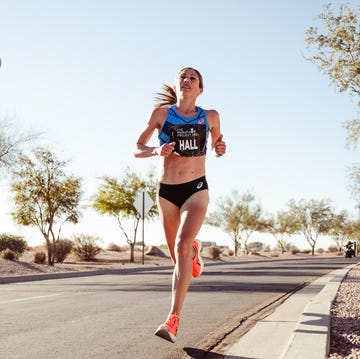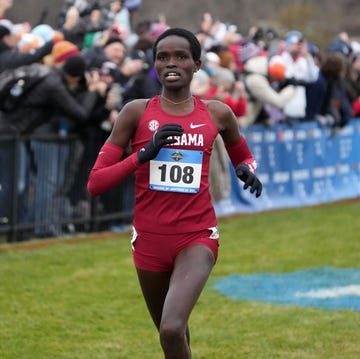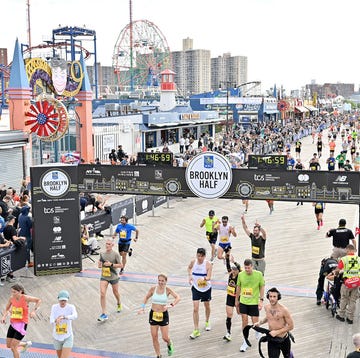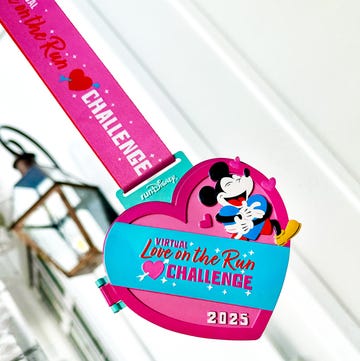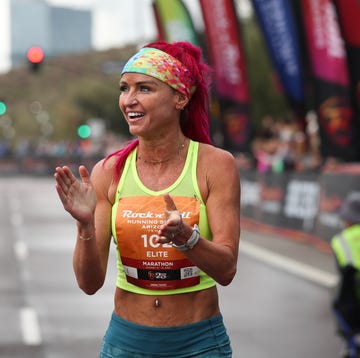Deena Kastor, the 2004 Athens Olympic marathon bronze medalist and American marathon record holder with a 2:21:16, will run the LaSalle Bank Chicago Marathon on October 9. Kastor's last race in Chicago was an American record victory in the LaSalle Bank Shamrock Shuffle 8K, as her 24:36 broke Lynn Jennings' U.S. mark by 26 seconds. The week before, Kastor had won the USA 8K in New York in 25:05, 49 seconds ahead of runnerup Jen Rhines. Kastor's 2:21:16 in the marathon came with a third place finish in London in 2003. She also holds the U.S. 10,000 record on the track with a 30:50.32. She was the 2003 Jesse Owens Award winner as the year's top track and field athlete. Kastor was a silver medalist in the World Cross Country 8k race in 2002 and 2003. She was a double USA Cross Country champ in 2000 in the 4k and 8k races. Kastor, 32, who lives in Mammoth Lakes, California, won the 10,000 at the U.S. Olympic Trials in 2000 and 2004. Coming back from injury in June, Kastor placed fourth in the 10,000 at the USA Championships in 31:45.08, finishing behind Katie McGregor, Blake Russell, and Jen Rhines and just missing a spot on the U.S. squad for the World Championships in Helsinki. We spoke to Kastor on Sunday, while she was visiting Chicago.
Runner's World Daily: Shoes & Gear?
Deena Kastor: Oh gosh, we're having a great time. We're doing a lot of TV stuff, and throwing pitches! I threw out the first pitch of the Red Sox/White Sox game last night and Mark Buehrle (a White Sox pitcher) caught my ball and signed it for me, and it was very cool. Then tomorrow night (Monday), I'm throwing out the first pitch at the Cubs/Giants game. It's been really fun. I'd actually been to a Cubs game at Wrigley Field when I wasn't old enough to enjoy the beer and bratwurst. The White Sox guys were so nice. They gave me a jersey with "Kastor" embroidered on it and the number "O5" for the year. One of my friends was watching the game on TV in California and they aired the interview with me and replayed my pitch.
RWD: Shoes & Gear?
DK: Yes, they did.
RWD: Health & Injuries?
DK: I did a good job. It wasn't like my practices were going. I actually threw a pretty good pitch. My practices weren't going too well (laughs).
RWD: It's early yet, but as you make these appearances in Chicago, do you sense that the city is really excited about its marathon?
DK: Absolutely. I got to meet with some training groups this weekend, the Chicago Area Runners Association. They have hundreds of people showing up on the weekends to run along the lake (Lake Michigan). It's so incredible how many people want to be a part of this. I also met with Team in Training. I've been waking up at 6:00 in the morning to run, and there are honestly thousands of people on the (lakefront) path running and riding their bikes. A lot of people have past years' Chicago Marathon t-shirts. The city really embraces. If you watch the news, they have training tips and ways to beat the heat because they're having sort of a heat wave here. So the entire city is really involved in it. The lakefront is the coolest place to be, and also very scenic. I tend to thrive off of having people around, and there are so many people around. It just thrills me to see so many ages out there using running as recreation.
RWD: Despite the setbacks you experienced this spring, there's still plenty of time for you to be on schedule for the Chicago Marathon, isn't there?
DK: Yes. Actually, just in the past two weeks, I had workouts that were very similar to the workouts we had just before I left for Athens. I'm really excited about the way my training is going, and feeling really strong and really good. I have a few weeks coming up now that I'm going to be hitting some higher mileage. I've been hovering around 100 to 110. My training is definitely indicating that I'm on pace to run a personal best.
RWD: You'd originally mentioned a sub-2:20 goal, so that's still something to realistically think about.
DK: My very realistic goal is sub-2:20, and then if training continues to go as well as it is and the conditions are right on that day, I'd like to run under 2:18.
RWD: Will this be a longer marathon buildup than you usually do? And did you go right into marathon mode after running the 10,000 at the USA Championships?
DK: Yeah. At U.S. nationals, and I even knew this before the race, if I made the team, I would take advantage of it and focus on track season and try to get in shape. I felt like I was very fit. I just needed time to get my legs under me, and ten days just wasn't enough time to do that. It seems like a week after nationals, I was having stellar workouts, thinking "I can't believe I'm this fit and not going to the World Championships." But if I made the team, I would have taken advantage of posting some good times on the track this summer, and if I didn't make the team, I was going to focus on Chicago, because that was another one of my other main goals for the year. So now everything is focused on Chicago. I'm running Falmouth Roadrace next month (August 14) and then the Philly Half (the Philadelphia Distance Run on September 18) and then the LaSalle Bank Chicago Marathon.
RWD: So you never thought that maybe going over and getting one 5000 in in Europe was a sensible thing for you to try.
DK: It just didn't seem possible.
RWD: You've done a lot of road races, but because of your schedule, you haven't gotten to do the really popular summer ones, so something like Falmouth in Massachusetts is almost like a new experience for you, isn't it?
DK: Yeah, absolutely. I had on my plan to do the Bix 7-Mile, but I'm taking this trip to Chicago and traveling takes a lot out of me when I have to travel from Mammoth. I was also thinking I would do Beach to Beacon (in Maine) because I'd love to do that some year. But we're going to be in Helsinki during the World Championships to help ASICS launch a new shoe. It's going to be their top of the line shoe.
RWD: Other Hearst Subscriptions?
DK: I rolled my foot in the yard and stressed the cuboid bone in my left foot. The doctor told me I would be out from six to eight weeks. It wasn't a stress fracture but because there wasn't just one point on the bone that was affected, it was the entire bone that was swollen and inflamed, he said he was going to treat it like a stress fracture. I was in a boot for two weeks to immobilize my foot, and then a week of walking and then a week of starting to run ten minutes one day, 15 minutes the next, increase by five-minute intervals for a week until just before nationals. I went down to San Diego and did four times a mile repeats with Jen (Rhines) on the track and then five days later was running in the national championships. While everybody else was tapering for the race, I had one workout under my belt. I felt very fit when I was injured, so that was to my benefit in healing quickly. Terrence Mahon, who is my new coach, also set up a program for me in the pool and I definitely feel like it was a great program that had me taxing different energy systems like I would during an entire week of running. But it wasn't overdoing it so I was taking energy away from healing. So I was working hard in the pool in the morning but not so hard that I wasn't able to heal.
RWD: It's a sad system that if something goes wrong on that one day at the USA Championships, that's pretty much it for the track season.
DK: Right. And we have a very fair system, because part of competition is being ready on that day. So I do feel it was fair. My injury just wasn't great timing, not that they ever are. But I feel like I had a great perspective, and I think that might have been one of the reasons I got over it (the injury) so quickly, because I was so optimistic and positive.
RWD: Other Hearst Subscriptions.
DK: Yes, absolutely. My whole thing is that "yeah, I can't run right now, but this is temporary, this is not career-ending, I'm going to do everything I can to try and get over this as quickly as possible and try and get back on the same track. First and foremost, I was just trying to heal.
RWD: The other Americans in the 10,000 weren't running the kind of times you had been hoping to run; you were talking about something close to 30:00 flat at one point. But are you impressed to notice how much people like Katie McGregor and Blake Russell have progressed?
DK: Yes. We're sending over an awesome team for the World Championships, just a fabulous team. I hope the girls are all as aggressive in the World Championships as they were in the national championships. I think they're all going to have great races if they run with the same confidence.
RWD: Meb Keflezighi is one of your Team Running USA teammates and a fellow Olympic marathon medalist. To what we know and observe about him, what can you add that gives some hints as to why he's developed into the great athlete that he is?
DK: I think the most impressive thing about Meb is really his entire family. His parents came here from a war and every single one of their children is successful. It's pretty incredible that they could get it right so many times. His parents should probably write a book. Every single one of them is successful in what they do, whether they're a lawyer or straight A student or getting into some of the top schools in the country. Everybody in the family bends over backwards for one another. They're all successful but they're all very respectful of each other.
RWD: So between now and the Chicago Marathon, you have a pretty long stretch ahead of you with just a couple of races. It's just "buckle down and get the job done" time.
DK: Yeah. I really enjoy staying at home and fitting in the training. That is how I prepare for races. I do want to take advantage of my fitness and get in a couple of races. I especially want to try and run a fast half-marathon. But when it comes down to it, I love being at home and training. This time of year, it's really perfect weather to be in Mammoth.
RWD: In late March, you mentioned the possibility of a sub-2:20 in Chicago. Now you've raised the possibility of a sub-2:18. Is there something that's happened in the intervening months that's made you think that the faster time is possible?
DK: Yeah. In my workouts, I've been very controlled, trying not to get too anxious and feisty and aggressive yet. But I've been able to hit some of the times that I was hitting in workouts last year when I was peaking and getting ready for Athens. And I remember those workouts as being very intense and forceful. This year, my body is just remembering it's conditioned to do this. Obviously, year in and year out, there's all this residual fitness from training. But the same type of training is coming with a lot less effort. I guess, in my mind, what I'm hoping is I can continue to run this way without much effort for the next month, and then when I really start putting the hammer down and being aggressive, I'll pick it up another notch.



